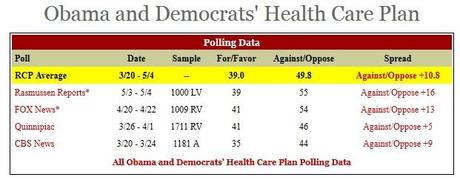While the House of Representatives, controlled by Republicans, have passed a number of bills to repeal Obamacare, the Senate is controlled by Democrats and those bills have died in the Senate. The next option for the House, who controls the purse strings, so to speak, was to starve Obamacare aka Affordable Care Act, which they have done by denying requests from the Obama administration for additional funds to implement Obama and Democrats' healthcare law.

RCP screen shot from 5/11/13
Hence the news that being reported that Health and Human Services Secretary Kathleen Sebelius is going to health industry officials to as for large financial donations to implement the unpopular healthcare law.
Over the past three months, Sebelius has made multiple phone calls to health industry executives, community organizations and church groups and asked that they contribute whatever they can to nonprofit groups that are working to enroll uninsured Americans and increase awareness of the law, according to an HHS official and an industry person familiar with the secretary’s activities. Both spoke on the condition of anonymity to talk openly about private discussions.
An HHS spokesperson said Sebelius was within the bounds of her authority in asking for help.
But Republicans charged that Sebelius’s outreach was improper because it pressured private companies and other groups to support the Affordable Care Act. The latest controversy has emerged as the law faces a string of challenges from GOP lawmakers in Washington and skepticism from many state officials across the country.
“To solicit funds from health-care executives to help pay for the implementation of the President’s $2.6 trillion health spending law is absurd,” Sen. Orrin G. Hatch (R-Utah) said in a statement. “I will be seeking more information from the Administration about these actions to help better understand whether there are conflicts of interest and if it violated federal law.”
Federal regulations do not allow department officials to fundraise in their professional capacity. They do, however, allow Cabinet members to solicit donations as private citizens “if you do not solicit funds from a subordinate or from someone who has or seeks business with the Department, and you do not use your official title,” according to Justice Department regulations.
Sebelius is no stranger to using her official capacity to act improperly:
And Rep. Andy Harris (R-Md.) said, “The appearance of impropriety is glaring and Congress must investigate and take action to ensure these implied threats do not continue.”
Even a whiff of impropriety would be bad news for Sebelius, who was found last year to have violated the Hatch Act, which prohibits political activity in her official capacity.
The U.S. Office of Special Counsel determined in September that Sebelius had offered an “extemporaneous partisan remark” at an event in North Carolina when she spoke in support of President Barack Obama’s reelection and in favor of a Democratic candidate for governor.
As the screen shot of the recent polling on Obama and Democrats' healthcare law, commonly referred to as Obamacare, shows, more than three years after Democrats pushed Obamacare through Congress and Obama signed it into law, the American public still opposes the law more than favoring it, by an average of 11 percentage points higher for those against the law than those in favor of it.
 As the more unpopular aspects of the law start being seen, those numbers are likely to get worse for Obamacare.
As the more unpopular aspects of the law start being seen, those numbers are likely to get worse for Obamacare.Which is why, three years later, Barack Obama is still trying to convince the public to support the law as evidenced by his renewed pitches.
Studies conducted after the 2010 midterm elections where Republicans took control of the House of Representative with the largest turnover of seats seen in decades, showed that voting for Obamacare is the reason Democrats lost as many seats as they did.
Republicans running in 2010 did so by promising to do everything in their power to repeal the Obamacare law. Republicans kept their word, they have voted to repeal it in multiple actions in the House, but Senate Democrats have refused to repeal it.
Republicans have done the next best thing, they are starving it, refusing to provide addition taxpayer funds to implement a law that those very taxpayers oppose.
Democratic Senators that were not on the ballot in the 2010 midterms, but voted to pass Obamacare against the opposition of the majority of the public, now are worried about paying the "political price" in the 2014 midterm elections, if implementation turns the whole thing into a "train wreck."
Out of the 21 Democratic Senate seats that are on the ballot in the 2014 midterm elections, 14 of them voted for Obamacare in 2009 (Roll call here), excluding those retiring.
Jeanne Shaheen (D-NH)
Tom Harkin (D-IA)
Mark Begich (D-AK)
Mark Pryor (D-AR)
Mark Udall (D-CO)
Richard Durbin (D-IL)
Mary Landrieu (D-LA)
Al Franken (D-Minn)
Tom Udall (D-NM)
Kay Hagan (D-NC)
Jeff Merkley (D-OR)
Jack Reed (D-RI)
Tim Johnson (D-SD)
Mark Warner (D-VA)
Remember those names comes November 2014.
Kudos to the GOP for keeping their word to the American public.
Related:
WuA Obamacare coverage.

